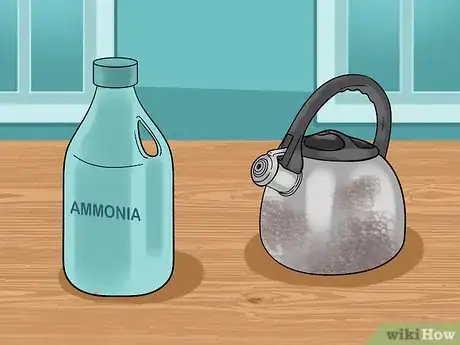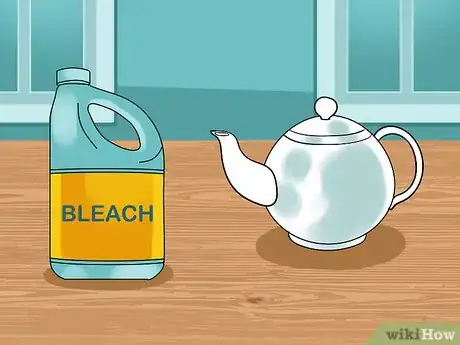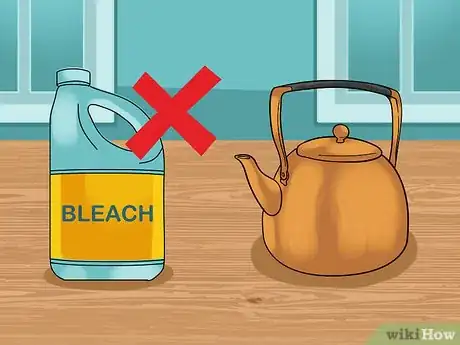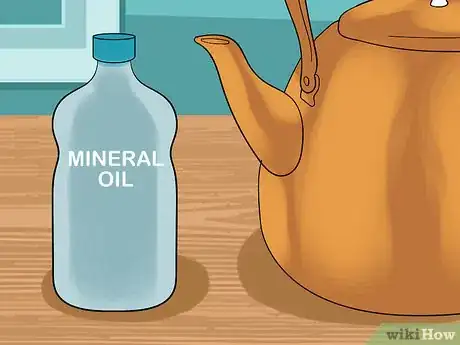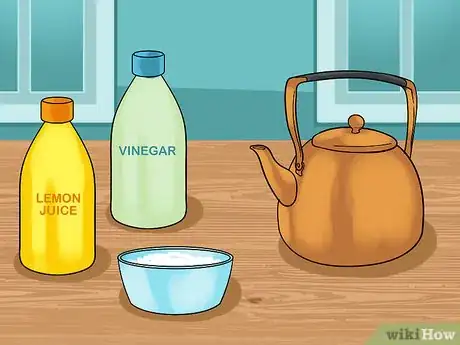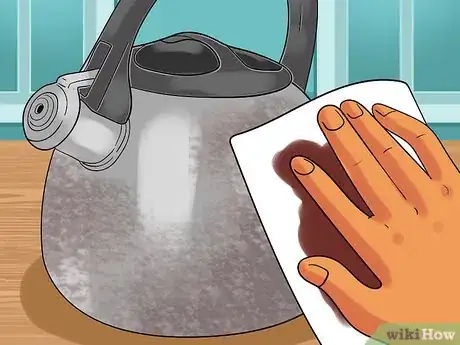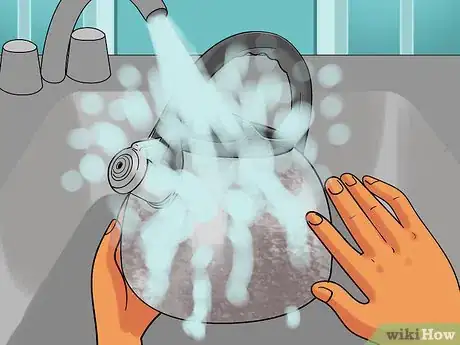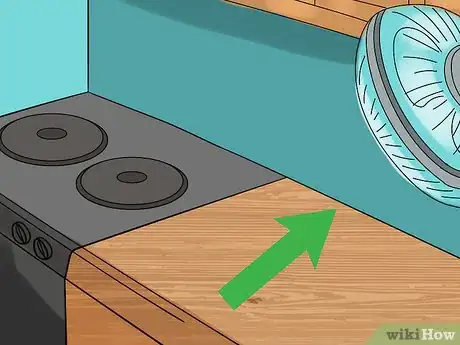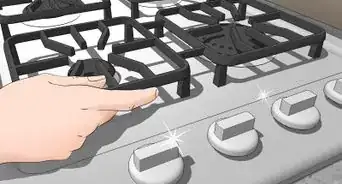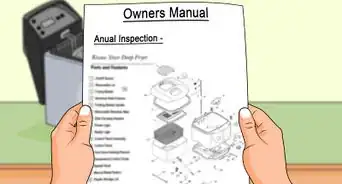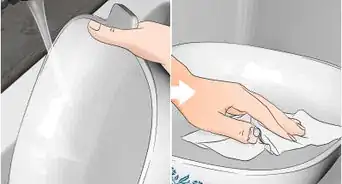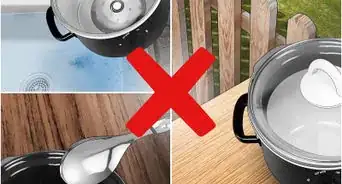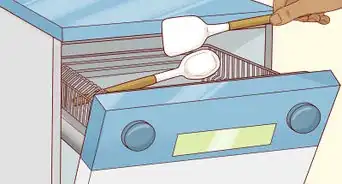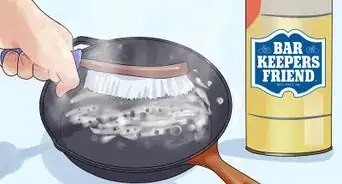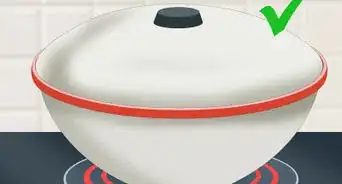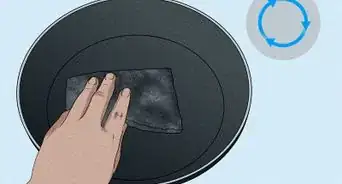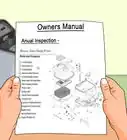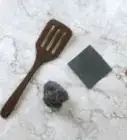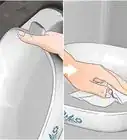This article was co-authored by Susan Stocker. Susan Stocker runs and owns Susan’s Green Cleaning, the #1 Green Cleaning Company in Seattle. She is well known in the region for outstanding customer service protocols — winning the 2017 Better Business Torch Award for Ethics & Integrity —and her energetic support of green cleaning practices.
This article has been viewed 87,672 times.
Grease can splatter in the kitchen, getting on appliances like tea kettles. If your tea kettle ends up splattered with grease, there are many ways to clean it. You can use chemical cleaners on various types of tea kettles. If you prefer more natural methods, things like lemon juice, soy sauce, and vinegar can remove stains. In the future, work on keeping your kettle out of the kitchen when you're cooking.
Steps
Using Chemical Cleaners
-
1Use ammonia or oven cleaner for stainless steel kettles. Stainless steel kettles can easily be cleaned with ammonia or oven cleaner. You can get both of these products at a local department or grocery store. Wipe down the kettle with one of these substances, using steel wool, to remove any type of stain, including a grease stain.
- You can scrub your kettle with a steel wool pad with a few drops of either oven cleaner or ammonia. Scrub it the same way you would scrub metal cookware and keep scrubbing until the stains come off. Then, rinse your kettle completely to remove the cleaner.
- However, never use ammonia or oven cleaner together. Some oven cleaners contain bleach, which makes a deadly gas when mixed with ammonia. Do not use ammonia if you used bleach to clean any part of the kettle, including the inside.
-
2Try bleach on enamel or porcelain kettles. Bleach is safe to use on kettles made with enamel or porcelain. It can effectively remove a variety of stains.
- These types of surfaces will scratch easily, so do not use abrasive cleaners. Use a soft rag or sponge to apply a few drops of bleach to your kettle and gently wipe it down until the stain comes off. Avoid harsh scrubbing.
- Make sure to use gloves when handling bleach.
- Dilute any bleach you use according to the package's instructions.
Advertisement -
3Avoid chemical cleaners with copper kettles. In general, you should not use commercial cleaners on copper. Copper is a more sensitive material and is easily damaged by chemical-based cleaners like bleach, ammonia, and oven cleaner. Only clean copper kettles with natural ingredients.
Cleaning with Natural Ingredients
-
1Target grease with mineral oil. Mineral oil can often successfully remove grease stains from a variety of products. You can buy mineral oil online, at a department store, or at a grocery store. Place a few drops of mineral oil on a piece of paper towel. Wipe down the surface of the kettle with the paper towel until the grease stain comes off.
- When you're done, dry the kettle with another piece of paper towel.
-
2Use vinegar and lemon juice on copper kettles. Copper kettles should not be treated with commercial cleaners. Mix lemon juice, vinegar, and salt together until you get a paste-like substance you apply to the kettle.
- Heat up some water in the kettle and then dump it out.
- Apply your paste to a paper towel and use that to rub down the kettle.
- When you're done, rinse the kettle. If the grease stain does not come off the first time, repeat this process.
-
3De-grease using soy sauce. Soy sauce can be surprisingly effective at removing grease stains. Try applying some soy sauce to a piece of paper towel. Then, rub down your kettle. With some effort, you should see grease stains disappear. When you're done, rinse off your kettle.[1]
Preventing Grease Stains
-
1Remove grease splatter promptly. The longer you let grease stains stick around, the harder they will be to remove. If grease splatters on your kettle while you're cooking, try to wipe it off quickly. Addressing the grease in the moment will prevent stains from setting in.[2]
- Usually, you can use water to quickly remove stains before they set.
-
2Use your fan when cooking. Tiny pieces of food grease can rise into the air when you're cooking. They can easily get stuck on household appliances, as well as your stove, cabinets, and walls. If you have a fan above your oven, turn it on when you're cooking. This will help break down and remove small particles of grease.[3]
-
3Keep your tea kettle off the stove when you cook. If you want to prevent grease stains, do not cook near your tea kettle. If you're using your stove, remove your tea kettle beforehand. Set it aside while you're cooking to prevent it from becoming damaged by grease.
Expert Q&A
-
QuestionHow can I get grease off of a ceramic sink?
 Susan StockerSusan Stocker runs and owns Susan’s Green Cleaning, the #1 Green Cleaning Company in Seattle. She is well known in the region for outstanding customer service protocols — winning the 2017 Better Business Torch Award for Ethics & Integrity —and her energetic support of green cleaning practices.
Susan StockerSusan Stocker runs and owns Susan’s Green Cleaning, the #1 Green Cleaning Company in Seattle. She is well known in the region for outstanding customer service protocols — winning the 2017 Better Business Torch Award for Ethics & Integrity —and her energetic support of green cleaning practices.
Green Cleaning Expert Baking soda is absolutely phenomenal when it comes to getting grease off of ceramic. Mix a small amount of baking soda with water to make a thick paste. Scoop the paste on to the grease and use the abrasive side of a sponge to scrub the grease off. Then, rinse the paste off.
Baking soda is absolutely phenomenal when it comes to getting grease off of ceramic. Mix a small amount of baking soda with water to make a thick paste. Scoop the paste on to the grease and use the abrasive side of a sponge to scrub the grease off. Then, rinse the paste off. -
QuestionHow do I clean glass tea kettle that has grease on it (outside)?
 MicheleTop AnswererPretty much the same way as a metal kettle. Use vinegar or lemon juice to cut through the grease. You can also use a grease-cutting dishwashing soap such as Dawn. Or, on a cooled kettle, try a glass cleaner like Windex. Be sure to wash the glass cleaner off with soap and water before placing on the stove to use again.
MicheleTop AnswererPretty much the same way as a metal kettle. Use vinegar or lemon juice to cut through the grease. You can also use a grease-cutting dishwashing soap such as Dawn. Or, on a cooled kettle, try a glass cleaner like Windex. Be sure to wash the glass cleaner off with soap and water before placing on the stove to use again. -
QuestionHow do I clean an aluminum tea kettle?
 Community AnswerTry Barkeeper's friend. It is a cleaning product you can buy from the store. It works very well.
Community AnswerTry Barkeeper's friend. It is a cleaning product you can buy from the store. It works very well.
Warnings
- Wear rubber gloves when using chemical cleaners.⧼thumbs_response⧽
- Test the cleaning treatment on an inconspicuous part of the tea kettle before applying the treatment to the whole thing.⧼thumbs_response⧽
Things You'll Need
- Ammonia
- Oven cleaner
- Steel wool sponge
- Soft rag
- Bleach
- Mineral oil
- Vinegar
- Soy sauce
